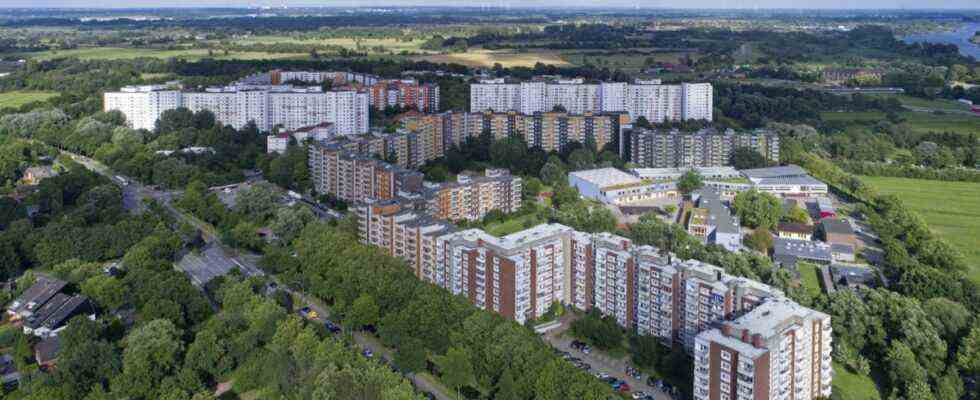It’s a cry for help from the country’s three largest cities. “For many tenants, the current situation means above all great uncertainty as to whether their apartment will still be affordable tomorrow,” explains Munich Mayor Dieter Reiter (SPD). Hamburg’s First Mayor Peter Tschentscher (SPD) urges that the cities “must be able to continue using this important instrument”, Berlin’s Governing Mayor Franziska Giffey (SPD) insists on the “important building block” for more tenant protection.
The two mayors and their counterpart published a joint statement on Wednesday, in which they demanded back a powerful right of first refusal for the municipalities. One sees “urgent need for action”, it is said, one will work with the federal and state governments.
Roughly speaking, the previous right of first refusal had allowed cities and municipalities to forestall private investors when buying houses if luxury renovations or high rent increases were feared. At the beginning of November, however, a judgment by the Federal Administrative Court largely overturned this regulation. In order to open up the possibility again, a new legal regulation would have to be in place. A corresponding initiative by the state of Berlin is currently in the Bundesrat, but no decision has yet been made on it. With the declaration, the three mayors are now increasing the pressure on the traffic light coalition in Berlin, which has declared that it wants to protect tenants better anyway.
Previously, the CSU had also warmed up to tightening the right of first refusal. Shortly after the verdict, the conference of building ministers of the federal states wanted to call on the federal government to change the law quickly, with the only dissenting vote coming from CSU-led Bavaria. One wanted to examine the reasoning for the verdict first, it was said to justify it.
Bavaria now also supports the demand
This long test now came to the same result as the short ones in the other federal states. Last Friday, Bavaria’s Minister of Construction, Kerstin Schreyer (CSU), also called on the federal government to “create the legal prerequisites” so that cities can “in future again have a larger number of the gutted right of first refusal”. The SPD-led Federal Building Ministry should “soon present a draft bill” for a corresponding change in the building code.
With the right of first refusal, municipalities in districts for which they have issued a preservation statute can prevent the sale of apartment buildings to investors and bring them into public ownership. According to the unanimous opinion of the Munich city administration, the right of first refusal is “the most effective instrument” against the displacement of tenants. In Berlin alone, cooperatives and state-owned companies had bought 2,674 apartments for a total of almost 530 million euros in this way since 2015.
The Federal Administrative Court had interpreted the Building Code in such a way that there is only a right of first refusal if a property is largely vacant or has expired. In most cases, however, this is not the case, and then the municipalities no longer have any recourse against the sale to investors.
Federal Building Minister Klara Geywitz (SPD) made it clear on Wednesday that she should not fail. “The municipal right of first refusal offers municipalities more design options to ensure affordable housing,” she said Süddeutsche Zeitung. “We need the protection of existing housing and building land to get more people into affordable housing.” A meeting of experts on the subject took place in Geywitz’s ministry on Wednesday. Their goal is, in the light of the judgment, to “quickly create a legally secure and practicable new regulation”.
The Greens in the federal government are also urging them to hurry. There is an “extremely high need for action,” said the Greens’ housing expert, Christina-Johanne Schröder.
The FDP first wants to examine other options for protecting tenants
Despite this broad front of advocates of the right of first refusal, a change in the law is likely to drag on. Because for this, the traffic light coalition in Berlin would first have to agree. The judgment of the Federal Administrative Court fell in the middle of the coalition negotiations in November, and the three parties agreed to check whether there was a “need for legislative action”. Ultimately, that leaves everything open.
According to the FDP, this test must be comprehensive, i.e. go beyond the verdict. “Before we think about changes to the right of first refusal, we have to review the entire set of tools to protect the milieu,” said Daniel Föst, spokesman for housing policy for the FDP parliamentary group, the SZ. The Munich member of the Bundestag emphasizes that there are also other ways to protect tenants in these areas, such as regulations for stable rents and protection against evictions. “Are these measures effective at all? Are we achieving the goals?”
Föst would also like to see the question of renovations taken into account, which on the one hand scares residents because they can lead to rent increases, but which on the other hand are necessary so that the buildings burn less energy. “There are many unanswered questions. For example, how will environmental protection areas be rehabilitated in the future and who should bear what costs.” So how much the tenants, how much the owners. The right of first refusal should thus be included in the coalition bargaining chip. It will probably be months before a common concept is formed.

